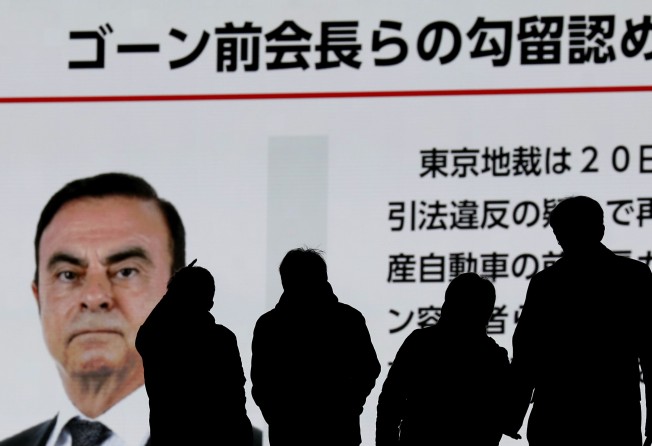Ghosn’s Christmas odyssey in a Tokyo jail reminds us to be sceptical of the idolatry and hagiography of corporate giants
- Carlos Ghosn was re-arrested before Christmas for the third time
- He now faces the more serious charge of breach of trust

One of the most important events and turning points in Asian business over the previous 12 month was the sudden and dramatic downfall of a corporate giant and leadership superstar in the world’s third-biggest economy.
This was the downfall of Carlos Ghosn in Japan. He was the architect and leading light of the two-decade old Renault-Nissan (and now Mitsubishi) alliance, forged by a US$5 billion investment. His was one of the most successful deals in the auto industry, with selling 10.6 million vehicles worldwide in 2017.
Yet, Ghosn spent his Christmas and New Year in non-festive detention in Tokyo. Instead of receiving the present of a release on bail, Ghosn was re-arrested for the third time just before Christmas. He now faces a new, more serious allegation of aggravated breach of trust, where he allegedly re-assigned US$16.6 million of personal investment losses from derivatives trading in 2008 to Nissan.
Ghosn, seen as the saviour of the once mighty Yokohama-based Nissan, was heralded as a charismatic leader with the Midas touch who could do no wrong – albeit the giveaway as “Le Cost-Cutter”.
The headline of his spectacular arrest in November following a tip-off by a whistle-blower captured the Japanese public’s interest and was also widely covered in the rest of Asia and the West.
This fascination was boosted by a series of allegations. These started with the alleged media strategy, manipulation and tip-off of a high-profile prosecutorial arrest as the press were waiting with prosecutors for Ghosn to touch down at Tokyo’s Haneda airport on a private Gulfstream jet, the Nissan-owned and registered NI55AN, with its clear overtures of corporate largesse.
Within a day of Ghosn’s arrest, Japanese tabloid magazines published detailed stories from anonymous sources about his extravagant, allegedly Nissan-funded lifestyle, to help paint a particular picture of him.
Then there were the varied reasons given for the arrest. These included the alleged US$44 million under-reporting in financial statements over a five-year period of Ghosn’s rewards, partly to avoid topping salary league tables, and also misstating deferred compensation by more than US$80 million. Another accusation was alleged improper use of company funds to buy residences in Paris, Beirut, Rio de Janeiro and Amsterdam.
Even more damning was the accusation of a US$100,000 a year ‘soft’ consultant contact, unfilled, given to a Ghosn family member.
We can locate this sorry saga within a specific and more general context. Firstly, we can note the growing tensions in the alliance, and Nissan’s rebellion at what the carmaker sees as a lopsided relationship, since the Japanese carmaker is more profitable and sells twice as many cars as Renault. Renault’s power over Nissan comes from its 43 per cent (the largest shareholder) voting rights and ability to name the carmaker’s chairman. In contrast, Nissan only has 15 per cent non-voting stake in Renault, whose largest shareholder (between 15 and 20 per cent) is the French state.
Secondly, it brings into sharp relief several important aspects of business in Japan, including its legal system and deeply embedded corporate and social culture.
Ghosn is in a legal system with one of the world’s highest conviction rates, as Japanese prosecutors rarely risk a not-guilty verdict. From a Western perspective, it seems odd that people can be held without charge for up to 20 days, get no access to lawyers during questioning and interviews, can only get bail after being indicted and can be simultaneously re-arrested on new charges – which starts the detention period anew, allowing prosecutors more time to hold them for questioning and to secure a confession to make trials easier – hence high success rates.
Japanese suspects who contest case facts are often refused bail on grounds that they may destroy evidence. Perhaps Ghosn won’t be surprised by this legal maze, if he recalled the 2015 arrest and similar treatment of Toyota’s first female managing officer, the American Julie Hamp. Some may hail both cases as examples of a somewhat xenophobic mindset.
In terms of corporate culture, Japan remains more traditionally collectivist and less individualist compared to the West.
Success, performance and rewards are classically seen as far more group-based and egalitarian. Less the swashbuckling, ‘heroic leader’ model here. Indeed, decision making has a tendency to be risk averse and consensus-based.
This case brings home some interesting and pertinent lessons. We should always remain wary, sceptical and critical of the tendency by the media and public to idolise ‘great’ leaders and their impact.
This has been put into perspective with this case. Finally, we can view this saga in the light of the story of Icarus, who flew too close to the sun. Ghosn seems to have done the same and has also now crashed to earth.
Chris Rowley is a visiting fellow at Kellogg College, University of Oxford and professor emeritus, Cass Business School, City, University of London. He is a leading figure in the study of employment and human resource management, business and management in Asia